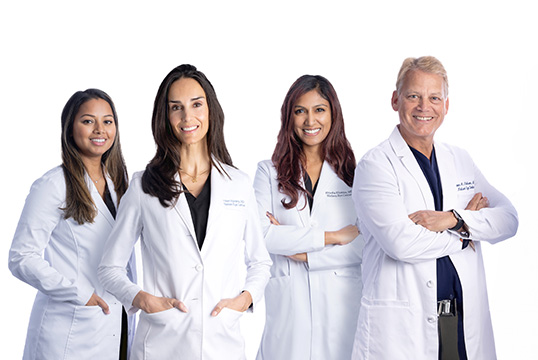Jump to Section
What Are Cataracts?
A cataract is the clouding of the eye’s naturally clear lens, which lies behind the iris (the colored part) and the pupil (the black center). The lens is a clear, oval structure with three layers: the nucleus, the cortex, and the capsule. The lens works much like a camera lens, focusing light onto the retina (light-sensitive tissue) at the back of the eye. The lens also adjusts the eye’s focus, allowing us to see things clearly, both up close and far away. A cataract develops when the nucleus becomes opaque (cloudy), or when small, cloudy areas develop in the cortex, blocking or scattering light.
What does this all mean? Basically, when a cataract is present, it may seem as though the eye is looking through a foggy window or a piece of waxed paper. Cataracts are very common; in fact, all of us will develop cataracts over the course of our lifetimes.
Our team of Boston-based eye doctors comprises leading experts in laser vision correction and eye surgery. At Nielsen Eye Center, we’re committed to providing personalized care to help you maintain healthy and clear vision for years to come. Learn more about our top providers and the exceptional service you can expect at Nielsen Eye Center, your premier destination for laser vision-correction, cataract surgery, and comprehensive eye care in Boston.
MEET OUR TEAM
Recognizing Cataract Symptoms
Cataract development is often subtle, with many individuals unaware of its progression due to gradual changes in vision. Early on, only a doctor can detect cataract formation.
As cataracts advance, however, the following symptoms may become noticeable:
- Blurry distance vision, particularly outdoors
- Seeing streaks or rays of light, especially when facing headlights or traffic lights
- Feeling the need to shield your eyes from sunlight, using a hand or visor
- Printed materials appearing faded or lacking contrast
- Colors appearing faded or altered—blue may seem green, and yellow may appear white
- Difficulty reading menus in dimly lit restaurants
UNDERSTANDING CATARACT TREATMENT OPTIONS
Cataracts are typically managed through surgery. It’s advisable to consider cataract surgery when the condition significantly impairs your vision, hindering daily activities. However, if the impact of cataracts on your eyesight is mild, alternative options such as updating your prescription or acquiring stronger reading glasses may suffice. Maintain regular visits to your eye doctor to monitor the progression of the cataract.
If you’re aged 45 or above and experiencing vision changes, or if you believe you may benefit from cataract surgery, we encourage you to reach out to the Nielsen Eye Center. Schedule a consultation at our Boston-area practice to discuss your options for cataract surgery.
Cataract development is a gradual process. Many people are unaware they have cataracts because the changes in their vision are so gradual. In fact, in the early stages of its development, only a doctor can detect cataract formation.
As cataracts continue to progress, however, the following symptoms may be noticeable:
- Blurry distance vision, especially outdoors
- Streaks or rays of light, especially when exposed to oncoming headlights or to traffic lights
- Instinctively shading your eyes from the sun, either with a hand or a visor
- Printed materials appearing faded or lacking contrast
- Colors appearing faded or changing hue – blue may look green and yellow may appear white
- Difficulty reading menus in restaurants with low-lighting
Featured Videos
Video libraryCataract Treatment
Cataracts are treated with surgery. Cataract surgery should be considered when cataracts cause enough loss of vision to interfere with daily activities. If your eyes are not seriously affected by cataracts, then it may be possible for you to get the help you need from a new distance prescription or stronger reading glasses. Continue to see your eye doctor regularly to evaluate how the cataract is progressing.
If you are 45+ and you notice a vision change, or you think you might be a candidate for cataract surgery, please contact the Nielsen Eye Center to schedule a consultation for cataract surgery at our Boston area Boston practice.
CATARACT SELF-TEST
LASIK SELF-TEST
DISCOVER OUR CONVENIENT
LOCATIONS NEAR BOSTON, MA
Schedule your appointment today at one of our four convenient offices situated on the South Shore. Serving the greater Boston area, our locations in Quincy, Weymouth, Norwell, and Norwood are here to provide exceptional eye care tailored to your needs.







